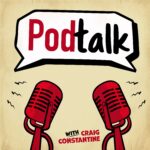
How can podcasting serve as an effective tool for active learning and decentralizing power dynamics in the classroom?
Experimenting with podcasting helps students move from passive listeners to active creators.
“They always get surprised at the end that, even as painful as it is in the process, you can look back and be like, ‘I knew nothing about any of this and now look what we’ve created.’” ~ Nicole Colter (19:36)
The conversation explores the innovative use of podcasting as a tool for active learning in higher education, particularly in a management class. Nicole explains how podcasting helps decentralize classroom power dynamics, allowing students to collaborate, manage projects, and co-create learning experiences. By recording interviews with textbook authors, students engage in active learning while gaining communication and organizational skills.
Nicole highlights the broader learning benefits of podcasting, such as fostering creativity, confidence, and reflective listening. She shares how students begin to see themselves as creators and take initiative beyond assigned tasks. Topics discussed include decentralized pedagogy, alternative assessment methods like “ungrading,” and the value of indirect learning outcomes. Nicole also reflects on challenges such as students’ initial struggles with conversation and project management, ultimately noting their surprise and pride in their final accomplishments.
Takeaways
Active learning through podcasting — Students engage deeply by creating content and interviewing experts.
Decentralized power dynamics — The course empowers students to manage their learning experience collaboratively.
Indirect learning outcomes — Podcasting facilitates valuable skills beyond stated course objectives, like communication and confidence.
Overcoming communication struggles — Students learn and practice the art of meaningful conversations.
The role of reflection — Listening to their own recordings helps students critically evaluate and improve their communication.
Project-based education — Podcasting replaces traditional tests with real-world, outcome-driven projects.
Encouraging creativity — Students begin to see themselves as capable creators, even outside assigned tasks.
Experimentation and adaptability — Nicole views each semester as an opportunity to refine processes based on reflections and feedback.
Practical management skills — Students apply concepts like planning, organizing, and leading through collaborative projects.
The value of open resources — Projects like interviewing textbook authors create accessible learning materials for others.
Resources
The Last Lecture — Randy Pausch’s book referenced for the concept of “head fake” learning, which emphasizes indirect learning outcomes.
(Written with help from Chat-GPT.)
— Hello👋 I’m Craig Constantine.
This is Podtalk. Short conversations with indie podcasters that are not just about podcasting, because I like to take the scenic route.
In each episode, I talk with podcasters about their shows, experiences, what they’ve learned, what motivates them, and… well, pretty much everything related to podcasting from the indie creator’s point of view. I hope these episodes spark ideas and conversations for you, and lead to new ways of looking at this wonderful art of podcasting.
If you like Podtalk, you’ll love the Podtalk Community.
I appreciate your time and attention, and I don’t take it for granted.
— Thank you!
Support Podtalk — If you like what I’m doing, please consider becoming a patron.
I invite you to cultivate a meaningful life—through presence, not pursuit. You can learn more about me and all my projects at, https://craigconstantine.com.
ɕ
